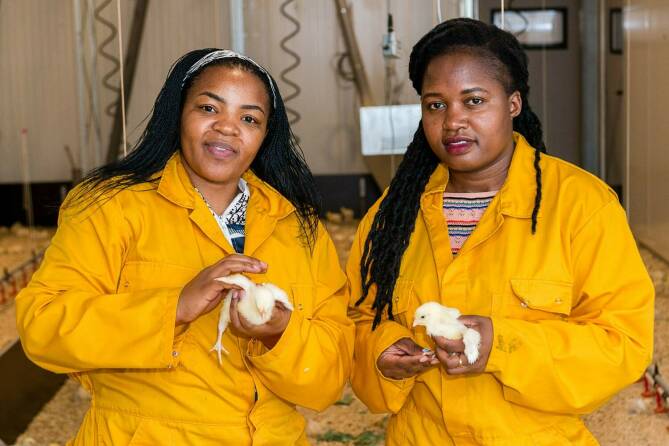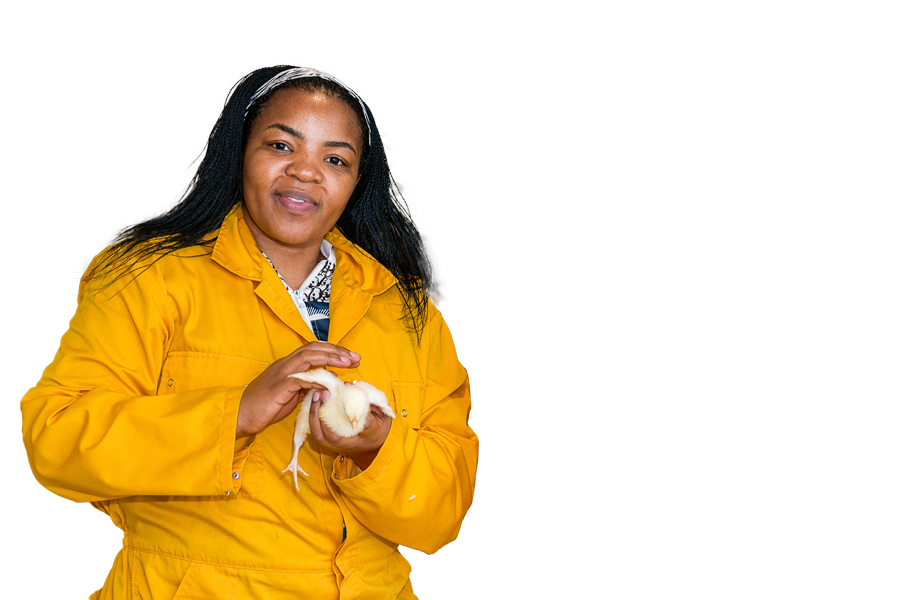
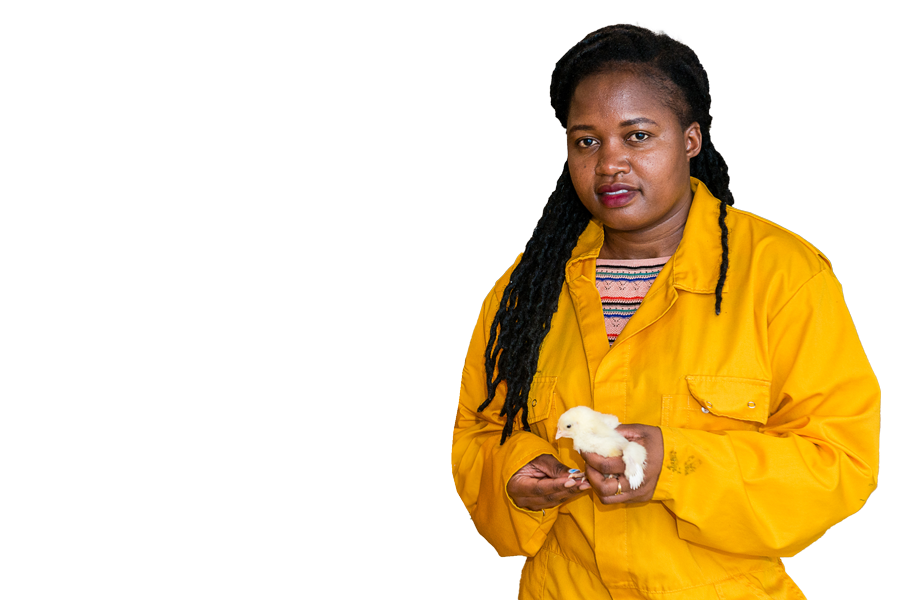
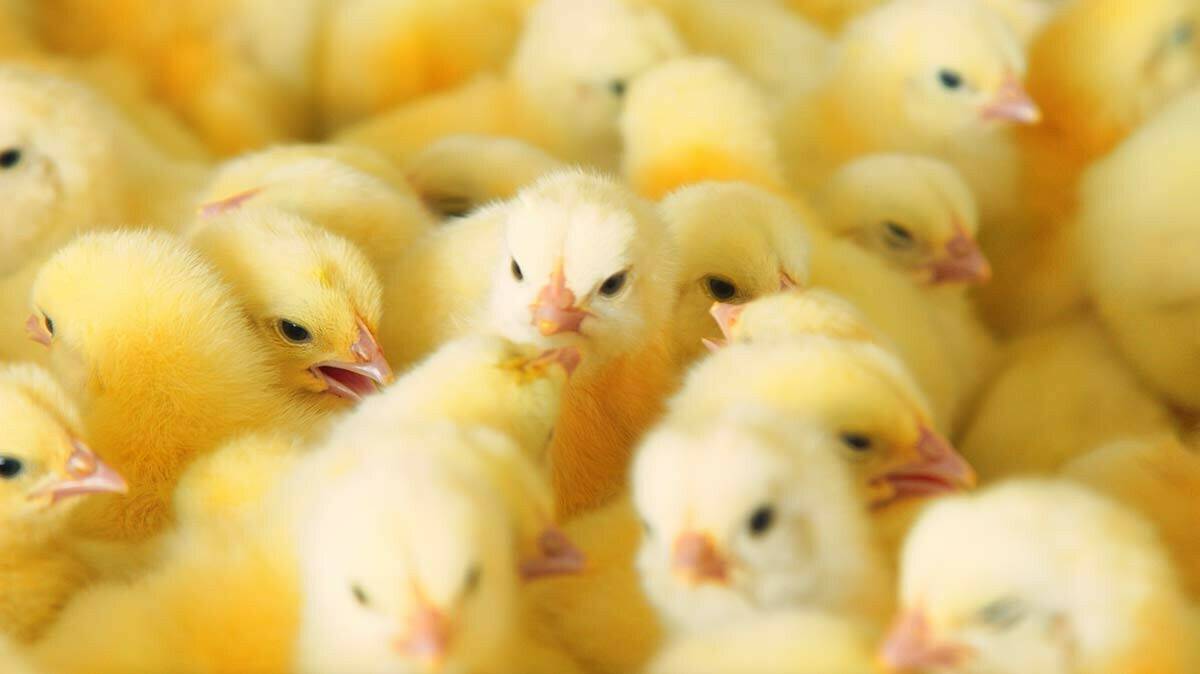
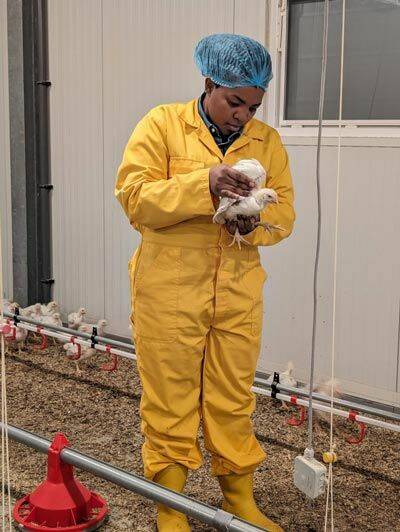
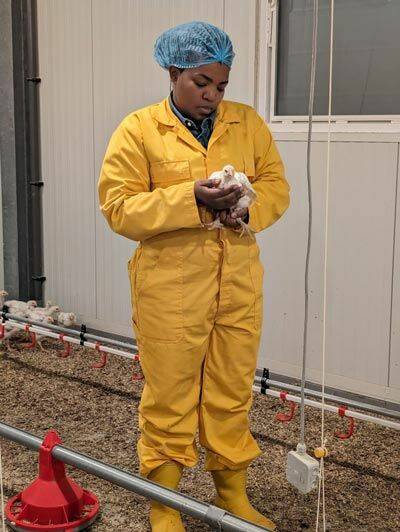
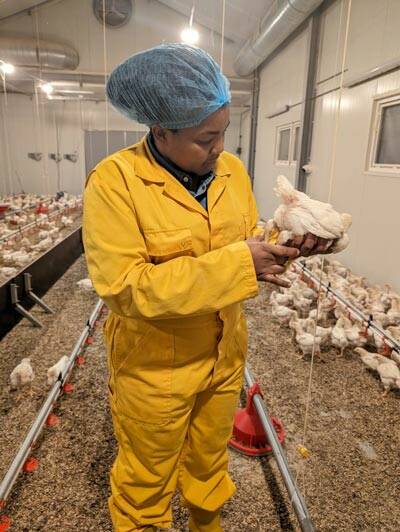
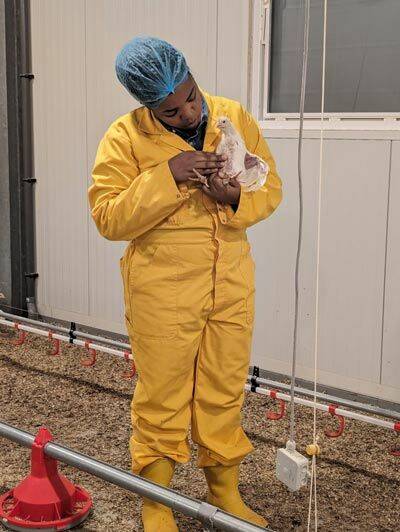
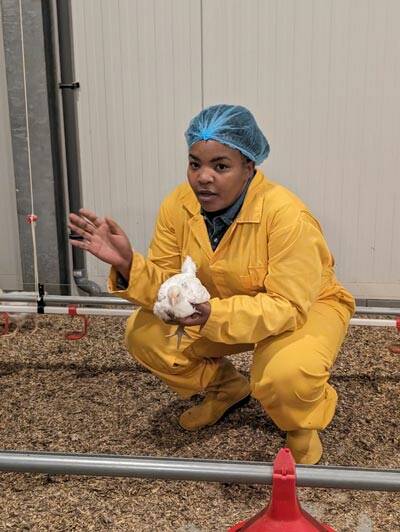
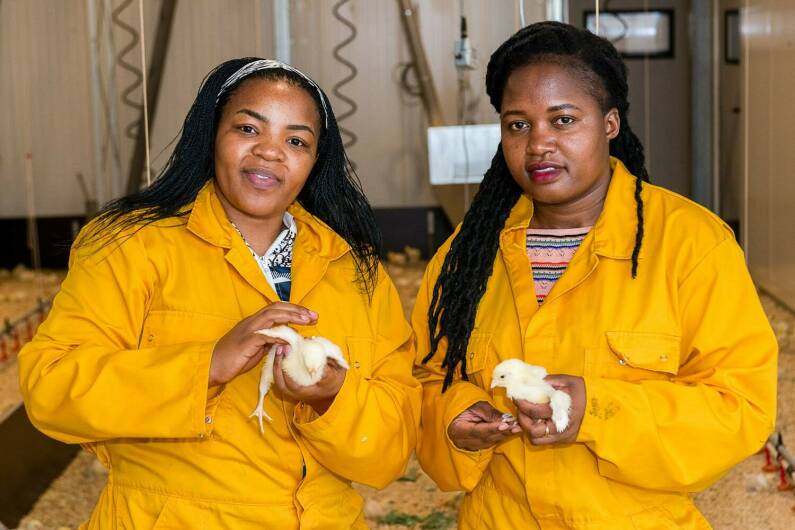
Jeanette Uwera from Rwanda and Josphine Achieng Owino from Kenya travelled to Barneveld in September 2023 to follow the International Poultry Management course. Both poultry professionals with a veterinarian background in their home country, they wanted to acquire more knowledge in their expertise to be able to use this back home.







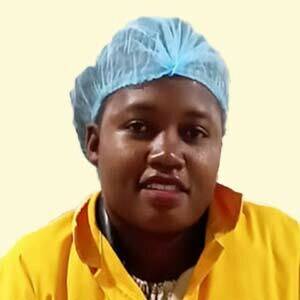
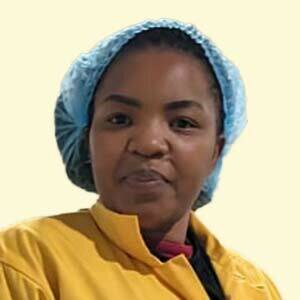
Jeanette Uwera is from Rwanda and is a veterinarian with a Master’s Degree in avian medicine. She came to know about ATCI after she finished her studies in 2021. “A classmate was told about Aeres by a friend of hers and applied. She asked me to apply too, but I told her I wasn’t ready to do something like that because I first wanted to work in the field.” Jeanette’s classmate got into the three month poultry management course and praised the course when she returned. “She wished that she could have stayed for a longer period, that’s how much she liked it. So she tried to convince me to enrol and she succeeded.”
Most students that come in contact with Aeres follow a same path as Jeanette: a friend or colleague has a good experience with one of the courses and advises another to enrol. This is the same for Josphine Achieng Owino from Kenya. She is a veterinarian paraprofesional, and works for a company called Kukuchic that breeds and distributes dual purpose chickens. “When you study to be a veterinarian in my country, you study all the animals. So you don’t actually focus on a specific animal. When I finished school, I came to work in the poultry industry, but I knew that I didn’t have as much specific knowledge about these animals as I wanted to have. So that is why I started looking for a college that could teach me a lot more about poultry.” Josphine already heard through social media about the existence of Aeres but didn’t know if it was a real place. “You can never be completely sure about what you see on social media. But then I heard about someone who followed a course there, so I knew it really existed. The first time I applied, I didn’t get in because I really didn’t know how to go about it. After that first rejection, I concentrated on the projects I was part of for a while. But last year I decided to give it another try, and I luckily enough I got in. It is a dream come true, because my work and interacting with farmers is something I am really passionate about.”
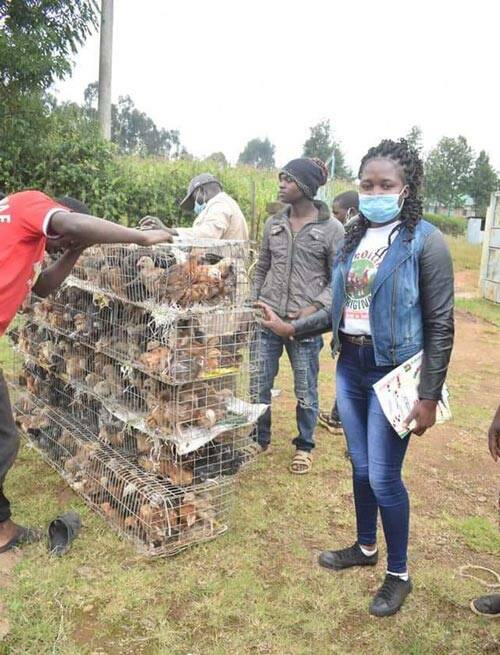
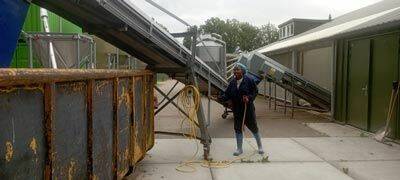
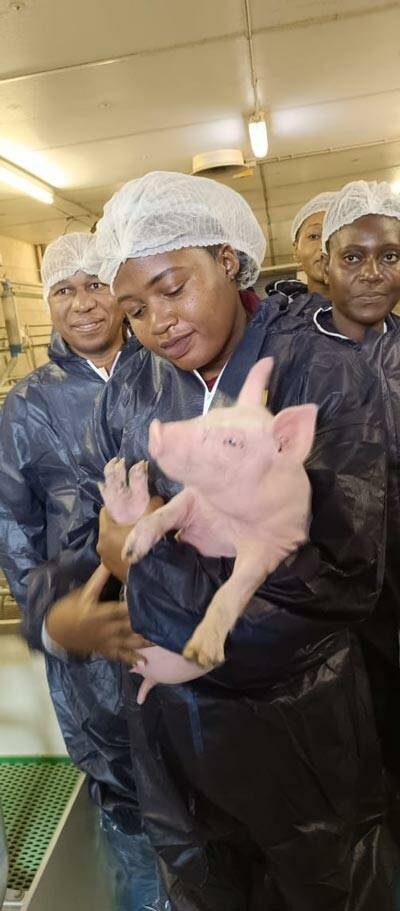
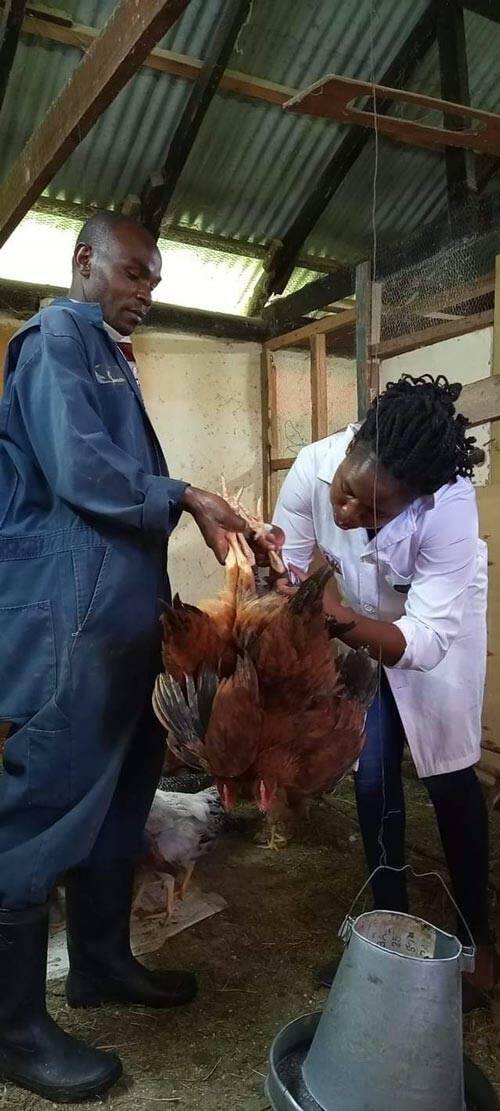
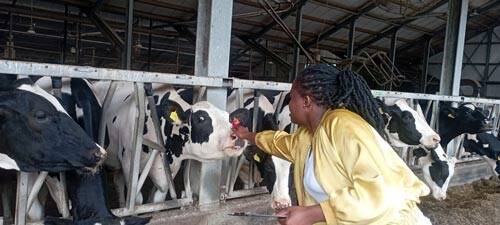
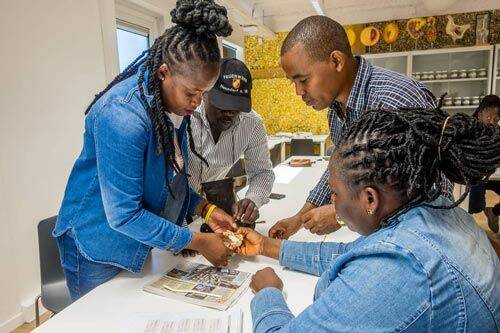
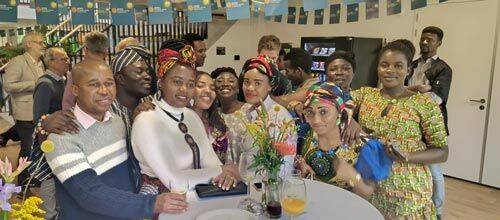
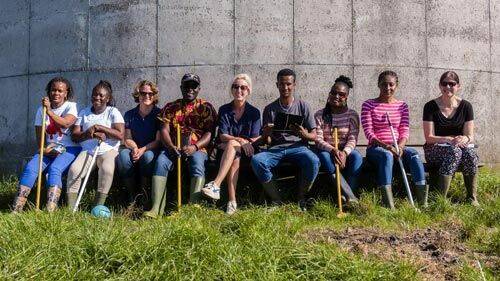
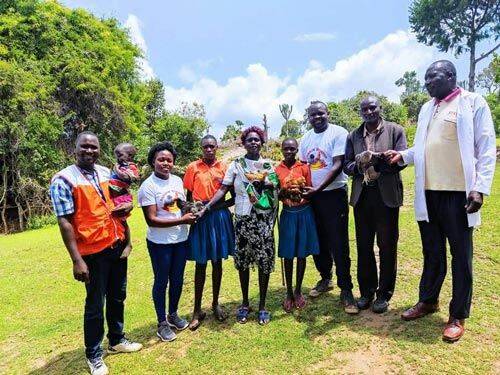
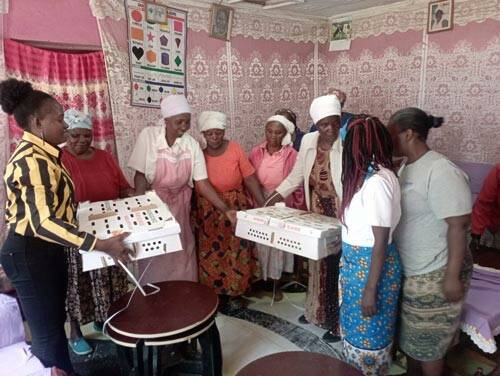
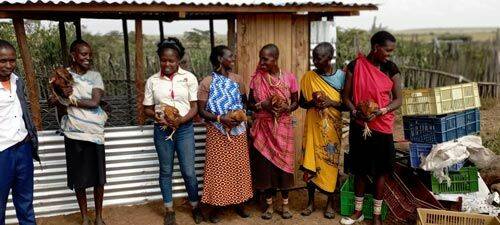












Josphine has the same experience. “I always want to give my best, but at the same time I didn’t feel I was giving the best I could. I had more potential and could have a bigger impact on companies and the industry in general.”
A big factor in wanting to study at ATCI for both Jeanette and Josphine is that they wanted to learn more than they were able to in their studies and jobs in their own country so far. Jeanette: “I always felt like I didn’t know enough, even though that was expected of me. I’m the person who went to school and the farmers look up to me, but I had the feeling that I had so little to offer them. I mostly resolved to advising them antibiotics, because that is what I knew. But here I have learned that there are a lot of other possibilities in treating birds, and also ways to prevent problems altogether.”



















Not only are chickens valuable in a practical way in Africa, but they also play an important role in empowering women, emphasizes Jeanette. “The idea is that cows belong to men, women don’t have the ownership of the cows. But when it comes to chicken, the chicken is an animal that belongs to everyone: men, women and children. So if you are a women, it is a privileged to own something, like a chicken. You then have your own source of income and this give you independence and opportunities.”
In Rwanda chickens are valued in the same way. Jeanette: “If you look at the projects in my country, you find that they are mostly focused on poultry. The government has a project where they buy chickens which they distribute among the poorest families in the many villages where malnutrition is a problem. In that way they at least have eggs and meat to eat.”
Both women are very passionate about chickens, not just because they are very fascinating or sweet animals, but because of the status chickens have in various African countries, explains Josphine. “In Africa we use chicken a lot. In my community, which is a rural community in Kenya, if you have a visitor, the most precious food you can give the visitor is chicken. If I wouldn’t do that, I would feel like a bad host. But also in the way of the nutritional values is chicken a very good product. This makes it possible for people with the smallest incomes to have their own healthy food supply, even if it is just a couple of eggs a week and a chicken once in a while.”












Jeanette also has the idea that she will be better at her work and will be able to help farmers with a lot of problems she didn’t know how to solve before. “It is not an easy job, because you have a lot of responsibilities towards the farmers and their families. If there is a problem, they depend on you to solve it. But if you don’t know what the cause of the problem is you can’t solve it. But now I think I have most of the solutions. And I will be able to sleep again and have my weekends back.”
Josphine: “For me, a lot of things have become clear as to why we have certain problems back in my country, because we didn’t have the knowledge. As for sick birds, we mostly would give them antibiotics. But I now know that you have a lot of options and are able to raise our chickens without using the drugs. We can prevent the animals from getting sick at all, if we look at more factors than we used to.” Were Josphine used to only look at the food the animals get and if that was good enough, she now takes a lot of other things into consideration. “For example the lighting I mentioned and the biosecurity Jeanette talked about. But also the climate in the poultry housing. I would enter the stalls, look if they have enough water and food, but didn’t think about the fact that they need a certain climate and that they are lower to the ground so there is a temperature and moisture difference between what I experience and what it is like for them. We thought we were doing things in a proper way, but with this new important information we will be able to deliver better than we were. That gives me a lot of confidence.”
An example is the keeping of records. “If you keep records of everything you do, you get a proper idea of what you are doing and what that does. For example, we didn’t know how important lighting is for your production. In the night we just switch of the light, because it is night so that is what you do. But we learned here that lighting is very important in the laying. So it is important to know when to turn it off and on. It has an effect on your production.” Another eye opening lesson was about safety en biosecurity, explains Jeanette. “If someone visits your farm or if you visit someone else’s farm, you just put a bag over your feet, because you may have something on your feet from another farm you visited. But now I know that is not enough, because it can be on your whole body and even your hair. So you have to change your clothes completely, disinfect and wear a hairnet and facemask to prevent the spreading of diseases. That was really eye-opening.”
Both Jeanette and Josphine have had very valuable experiences during their stay at Barneveld. Jeanette: “It is much more detailed information we get here. The training I had in Africa was very general, we learned about every animal we could encounter. This meant we don’t have deep knowledge about one animal. I have learned more about chickens in my work, but still not as much as I wished. And coming here, we really dove into just chickens. We go way deeper than we did so far.” Josphine sees the biggest difference in the way companies are organised and what they take into consideration. “What most companies in my country do isn’t bad, but it isn’t good either. Of course we know the standard things, think about the feeding for example. We know how to do it to get a good product. But we don’t care about the little things that are so important in improving your farm.”

















Both women have grown very fond of the Netherlands and the people they have met. Josphine: “People are very tolerant and friendly. When I first came here, I didn’t know where the school was, so I was at the train station and didn’t know how to go from there. I just asked two ladies if they could tell me the way, but they had no idea either. Luckily enough they had smartphones to google it and even walked me to the school. That was such a good first impression, it made me feel very welcome and safe.” Not even the weather sets them back, emphasizes Jeanette. “I prefer colder weather over the really hot weather in a lot of African countries. Because when it is cold you just cover yourself in layers, but when you are hot you just keep being hot and are not able to do anything. So the colder, wetter weather is nice if you ask me.”
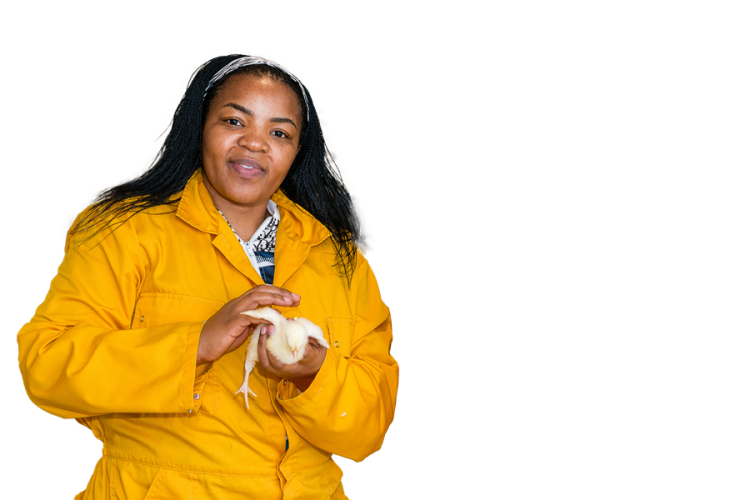
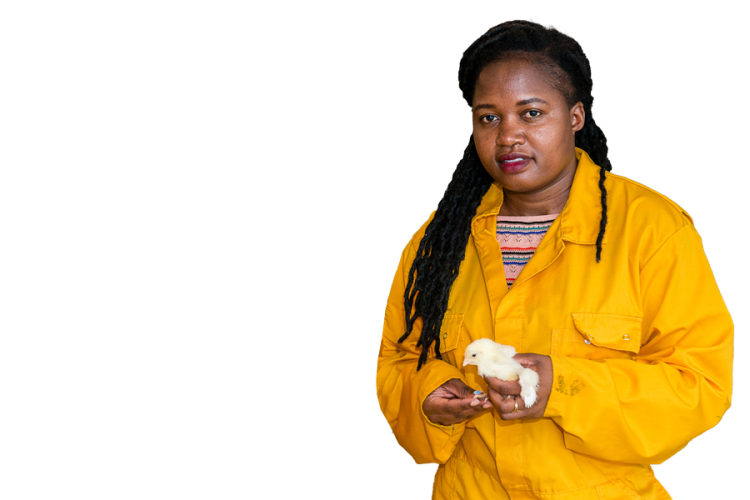
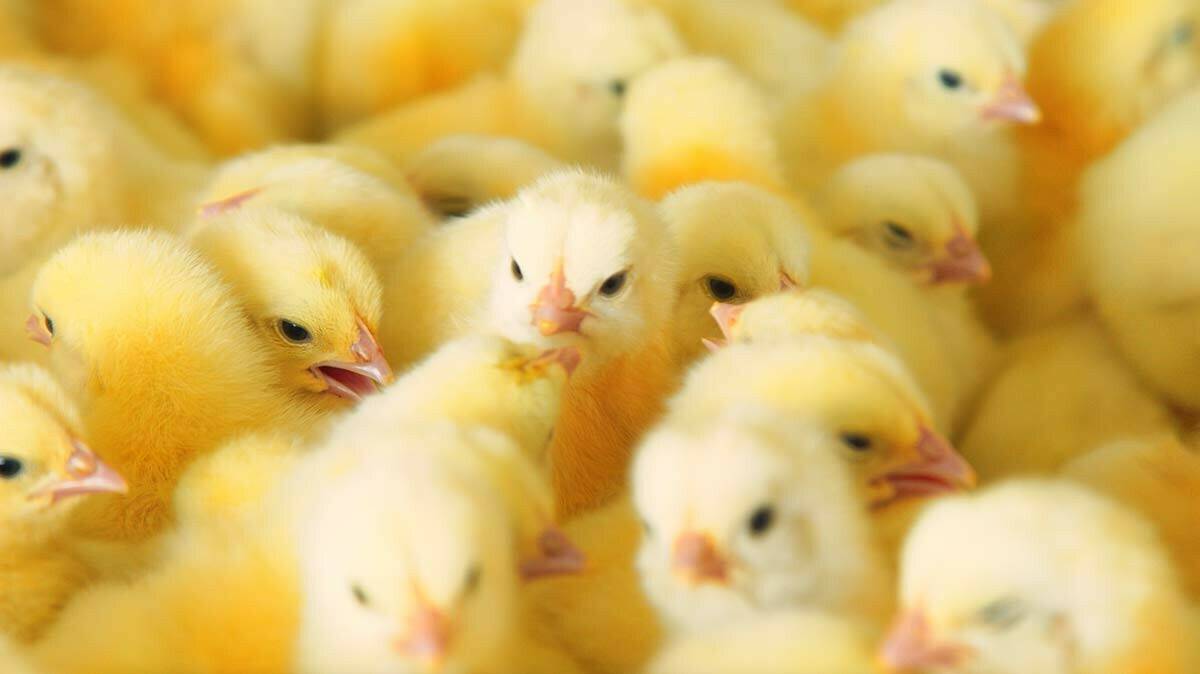



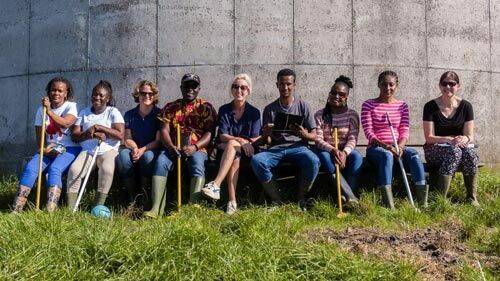
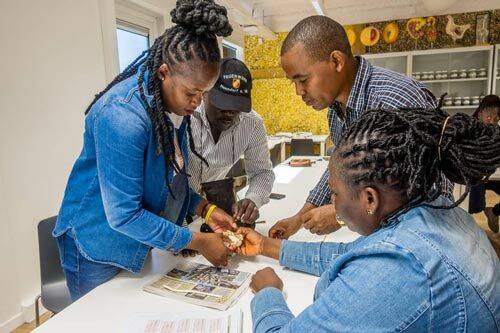

Both women have grown very fond of the Netherlands and the people they have met. Josphine: “People are very tolerant and friendly. When I first came here, I didn’t know where the school was, so I was at the train station and didn’t know how to go from there. I just asked two ladies if they could tell me the way, but they had no idea either. Luckily enough they had smartphones to google it and even walked me to the school. That was such a good first impression, it made me feel very welcome and safe.” Not even the weather sets them back, emphasizes Jeanette. “I prefer colder weather over the really hot weather in a lot of African countries. Because when it is cold you just cover yourself in layers, but when you are hot you just keep being hot and are not able to do anything. So the colder, wetter weather is nice if you ask me.”
Jeanette also has the idea that she will be better at her work and will be able to help farmers with a lot of problems she didn’t know how to solve before. “It is not an easy job, because you have a lot of responsibilities towards the farmers and their families. If there is a problem, they depend on you to solve it. But if you don’t know what the cause of the problem is you can’t solve it. But now I think I have most of the solutions. And I will be able to sleep again and have my weekends back.”
Josphine: “For me, a lot of things have become clear as to why we have certain problems back in my country, because we didn’t have the knowledge. As for sick birds, we mostly would give them antibiotics. But I now know that you have a lot of options and are able to raise our chickens without using the drugs. We can prevent the animals from getting sick at all, if we look at more factors than we used to.” Were Josphine used to only look at the food the animals get and if that was good enough, she now takes a lot of other things into consideration. “For example the lighting I mentioned and the biosecurity Jeanette talked about. But also the climate in the poultry housing. I would enter the stalls, look if they have enough water and food, but didn’t think about the fact that they need a certain climate and that they are lower to the ground so there is a temperature and moisture difference between what I experience and what it is like for them. We thought we were doing things in a proper way, but with this new important information we will be able to deliver better than we were. That gives me a lot of confidence.”
An example is the keeping of records. “If you keep records of everything you do, you get a proper idea of what you are doing and what that does. For example, we didn’t know how important lighting is for your production. In the night we just switch of the light, because it is night so that is what you do. But we learned here that lighting is very important in the laying. So it is important to know when to turn it off and on. It has an effect on your production.” Another eye opening lesson was about safety en biosecurity, explains Jeanette. “If someone visits your farm or if you visit someone else’s farm, you just put a bag over your feet, because you may have something on your feet from another farm you visited. But now I know that is not enough, because it can be on your whole body and even your hair. So you have to change your clothes completely, disinfect and wear a hairnet and facemask to prevent the spreading of diseases. That was really eye-opening.”
Both Jeanette and Josphine have had very valuable experiences during their stay at Barneveld. Jeanette: “It is much more detailed information we get here. The training I had in Africa was very general, we learned about every animal we could encounter. This meant we don’t have deep knowledge about one animal. I have learned more about chickens in my work, but still not as much as I wished. And coming here, we really dove into just chickens. We go way deeper than we did so far.” Josphine sees the biggest difference in the way companies are organised and what they take into consideration. “What most companies in my country do isn’t bad, but it isn’t good either. Of course we know the standard things, think about the feeding for example. We know how to do it to get a good product. But we don’t care about the little things that are so important in improving your farm.”
A big factor in wanting to study at ATCI for both Jeanette and Josphine is that they wanted to learn more than they were able to in their studies and jobs in their own country so far. Jeanette: “I always felt like I didn’t know enough, even though that was expected of me. I’m the person who went to school and the farmers look up to me, but I had the feeling that I had so little to offer them. I mostly resolved to advising them antibiotics, because that is what I knew. But here I have learned that there are a lot of other possibilities in treating birds, and also ways to prevent problems altogether.”
Josphine has the same experience. “I always want to give my best, but at the same time I didn’t feel I was giving the best I could. I had more potential and could have a bigger impact on companies and the industry in general.”
Not only are chickens valuable in a practical way in Africa, but they also play an important role in empowering women, emphasizes Jeanette. “The idea is that cows belong to men, women don’t have the ownership of the cows. But when it comes to chicken, the chicken is an animal that belongs to everyone: men, women and children. So if you are a women, it is a privileged to own something, like a chicken. You then have your own source of income and this give you independence and opportunities.”
In Rwanda chickens are valued in the same way. Jeanette: “If you look at the projects in my country, you find that they are mostly focused on poultry. The government has a project where they buy chickens which they distribute among the poorest families in the many villages where malnutrition is a problem. In that way they at least have eggs and meat to eat.”
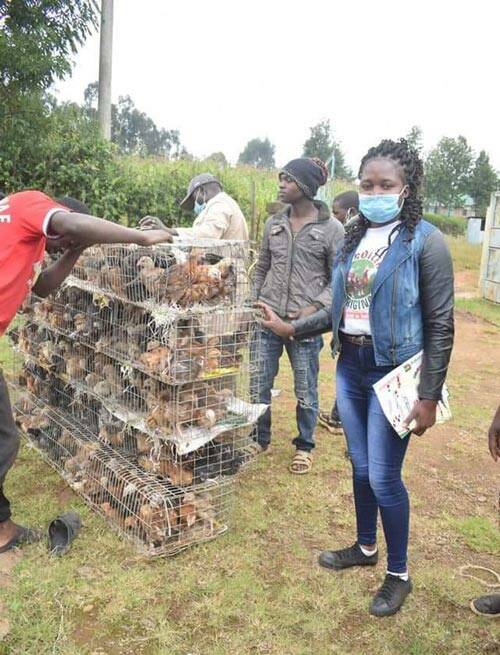
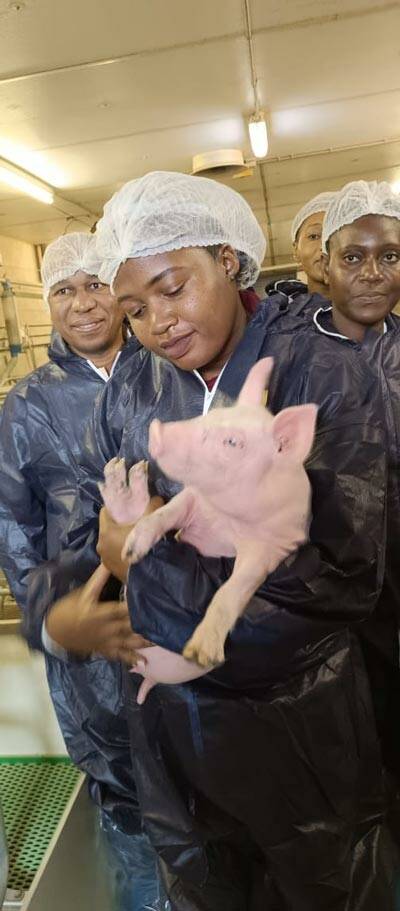
Both women are very passionate about chickens, not just because they are very fascinating or sweet animals, but because of the status chickens have in various African countries, explains Josphine. “In Africa we use chicken a lot. In my community, which is a rural community in Kenya, if you have a visitor, the most precious food you can give the visitor is chicken. If I wouldn’t do that, I would feel like a bad host. But also in the way of the nutritional values is chicken a very good product. This makes it possible for people with the smallest incomes to have their own healthy food supply, even if it is just a couple of eggs a week and a chicken once in a while.”
Most students that come in contact with Aeres follow a same path as Jeanette: a friend or colleague has a good experience with one of the courses and advises another to enrol. This is the same for Josphine Achieng Owino from Kenya. She is a veterinarian paraprofesional, and works for a company called Kukuchic that breeds and distributes dual purpose chickens. “When you study to be a veterinarian in my country, you study all the animals. So you don’t actually focus on a specific animal. When I finished school, I came to work in the poultry industry, but I knew that I didn’t have as much specific knowledge about these animals as I wanted to have. So that is why I started looking for a college that could teach me a lot more about poultry.” Josphine already heard through social media about the existence of Aeres but didn’t know if it was a real place. “You can never be completely sure about what you see on social media. But then I heard about someone who followed a course there, so I knew it really existed. The first time I applied, I didn’t get in because I really didn’t know how to go about it. After that first rejection, I concentrated on the projects I was part of for a while. But last year I decided to give it another try, and I luckily enough I got in. It is a dream come true, because my work and interacting with farmers is something I am really passionate about.”

Jeanette Uwera is from Rwanda and is a veterinarian with a Master’s Degree in avian medicine. She came to know about ATCI after she finished her studies in 2021. “A classmate was told about Aeres by a friend of hers and applied. She asked me to apply too, but I told her I wasn’t ready to do something like that because I first wanted to work in the field.” Jeanette’s classmate got into the three month poultry management course and praised the course when she returned. “She wished that she could have stayed for a longer period, that’s how much she liked it. So she tried to convince me to enrol and she succeeded.”

Jeanette Uwera from Rwanda and Josphine Achieng Owino from Kenya travelled to Barneveld in September 2023 to follow the International Poultry Management course. Both poultry professionals with a veterinarian background in their home country, they wanted to acquire more knowledge in their expertise to be able to use this back home.
